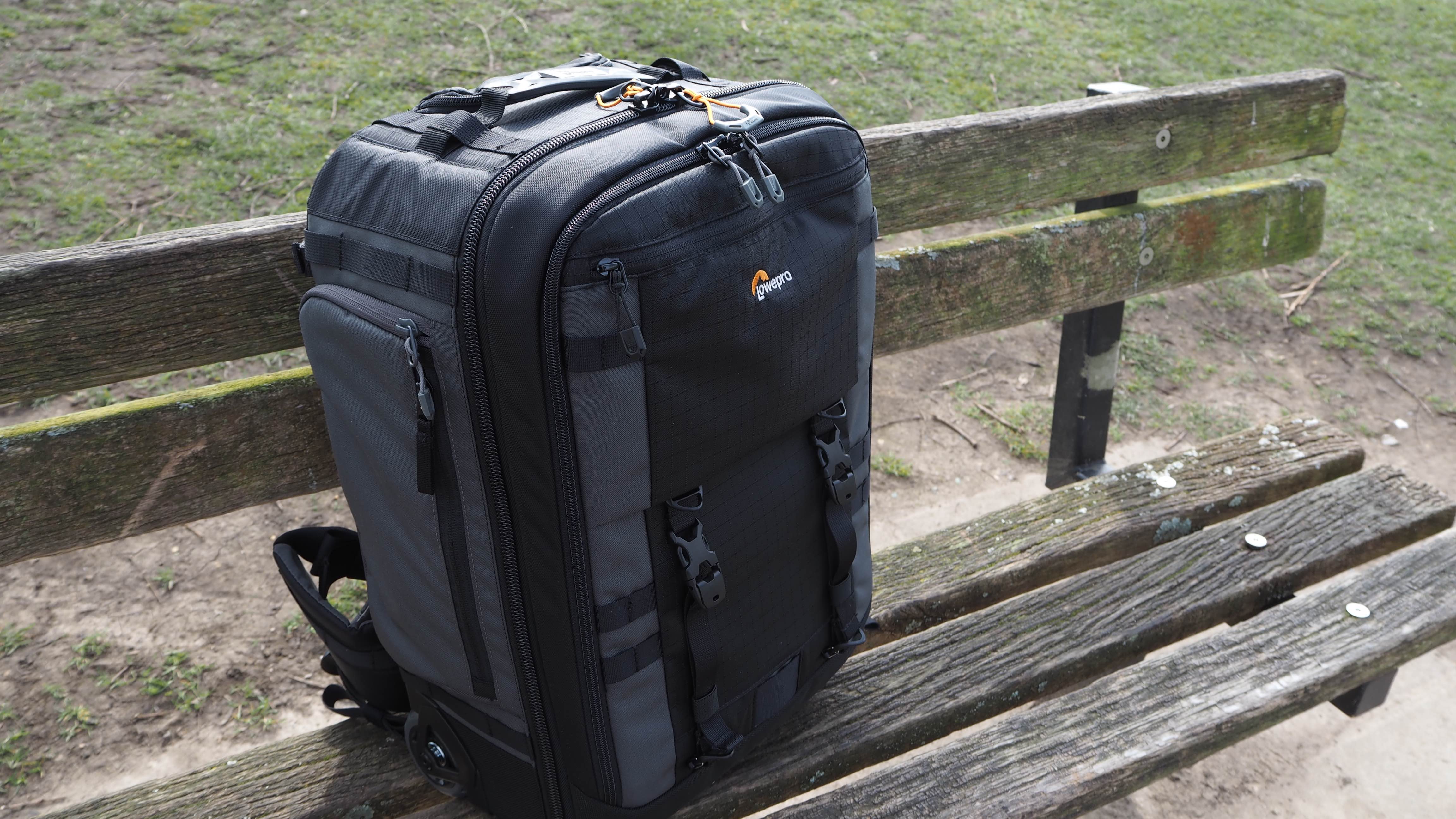
There are various ways in which we can choose to transport our camera gear. In one of the best camera backpacks, via a crush-proof hard case, or perhaps we want to take the load off and opt for a roller bag with wheels at the base and a trolley-style handle at the top?
At first glance, cleverly, the Lowepro Pro Trekker RLX 450 AW II appears to be offering most of these options in one product. Though the result is that it’s big and bulky when lifted out of its delivery box, its manufacturer insists it’s been sized to squeeze within airline carry-on restrictions.
If you are a photographer who travels a lot, the versatility here should appeal, at least on paper. But in practice, how does one camera pack that can be handled in a lot of different ways pan out? Read on to find out.
Lowepro Pro Trekker RLX 450 AW II: Specifications
Lowepro Pro Trekker RLX 450 AW II: Price
Available since June 2024, and costing $469.95 / £319 at the time of writing, the high-ish asking price of the Lowepro Pro Trekker RLX 450 AW II reflects its versatility, features, and overall ruggedness of build. Alternatively, there are cheaper versions in its manufacturer’s own range if you don’t quite need all the bells and whistles here. A slightly more compact and less expensive wheeled competitor can be found in the Vanguard VEO Select 55BT, which likewise features harness-like straps at the rear so it can be converted into a backpack. Overall, the Lowepro feels fair for what we get, given the quality and flexibility of the product in terms of not only what can be put in it, but also how we handle and carry it.
Lowepro Pro Trekker RLX 450 AW II: Design & Handling
With 68% of its construction claimed to be from recycled fabrics, the design here is very outdoors-y, the rugged-looking black and grey polyester and nylon exterior more seemingly suited to yomping and trekking in the wild, as suggested by the product name, than the inside of airports and train stations.
However, handling wise, should I get weary of carrying the Lowepro Pro Trekker RLX 450 AW II on my back, the big plus is that I can plonk it on the ground, unzip and extend its trolley style handle, and wheel it around instead. Provided I’m not on uneven terrain of course.
As the pack weighs just over 4Kg when empty and has a 28-litre total volume, the option to transport it in a variety of ways adds comfort and practicality. While the trolley handle is a little narrow in width than those of competitors and the wheels at the base are hard plastic rather than rubber, I can live with that.
Capacity-wise, we have room here for the usual pair of mirrorless or smaller DSLR bodies and up to five or six lenses. Alternatively, there would be space for a pro-level DSLR such as the Canon 5D Mark IV or similar, with up to a 70-200mm f/2.8 lens. One caveat is that the extendable travel handle of the pack itself takes up some of the interior depth, so those with cameras with bigger bodies and chunkier lenses may find it all a bit of a squeeze. Its maker does, however suggest that it would accommodate a foldable camera drone.
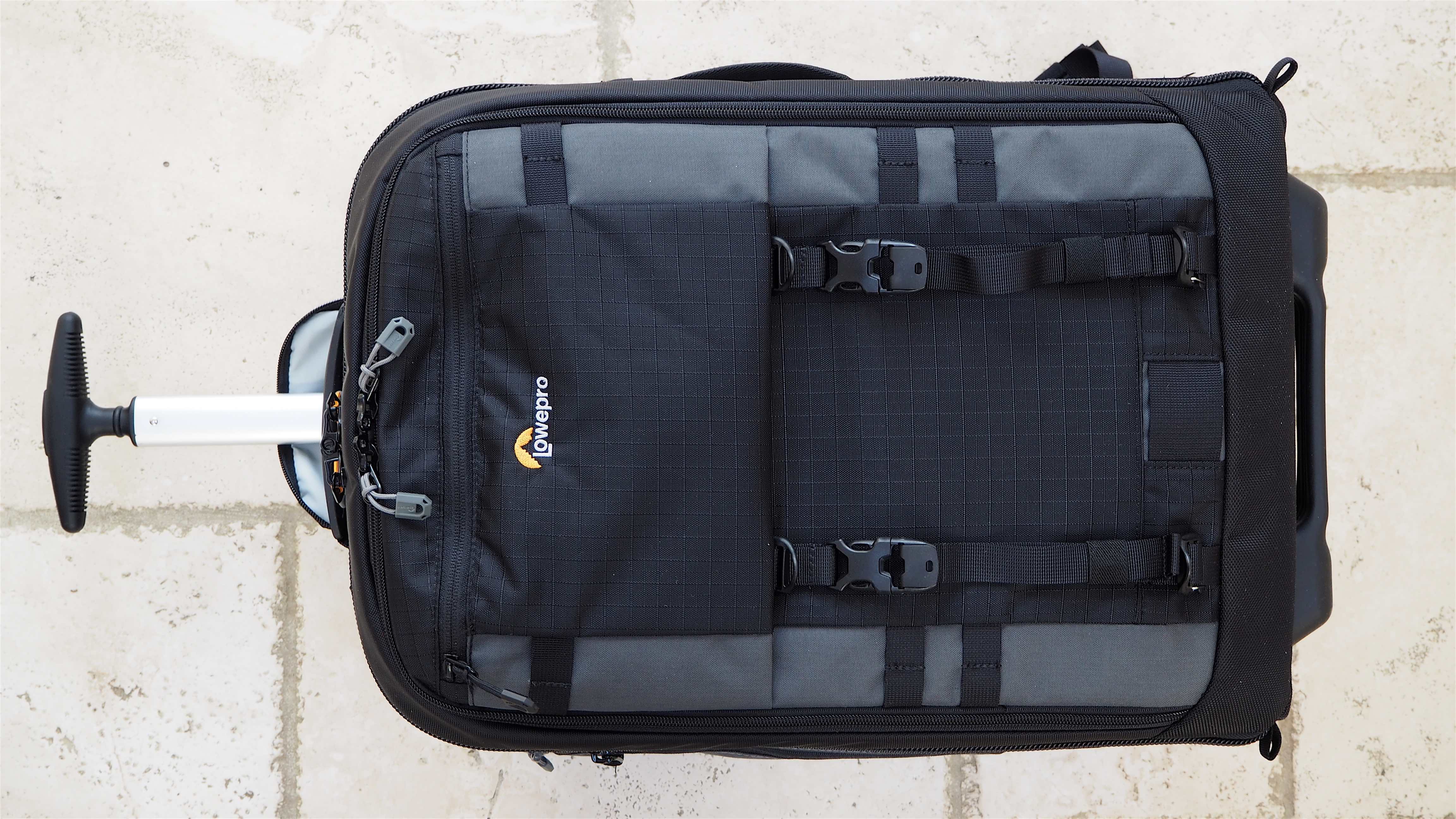
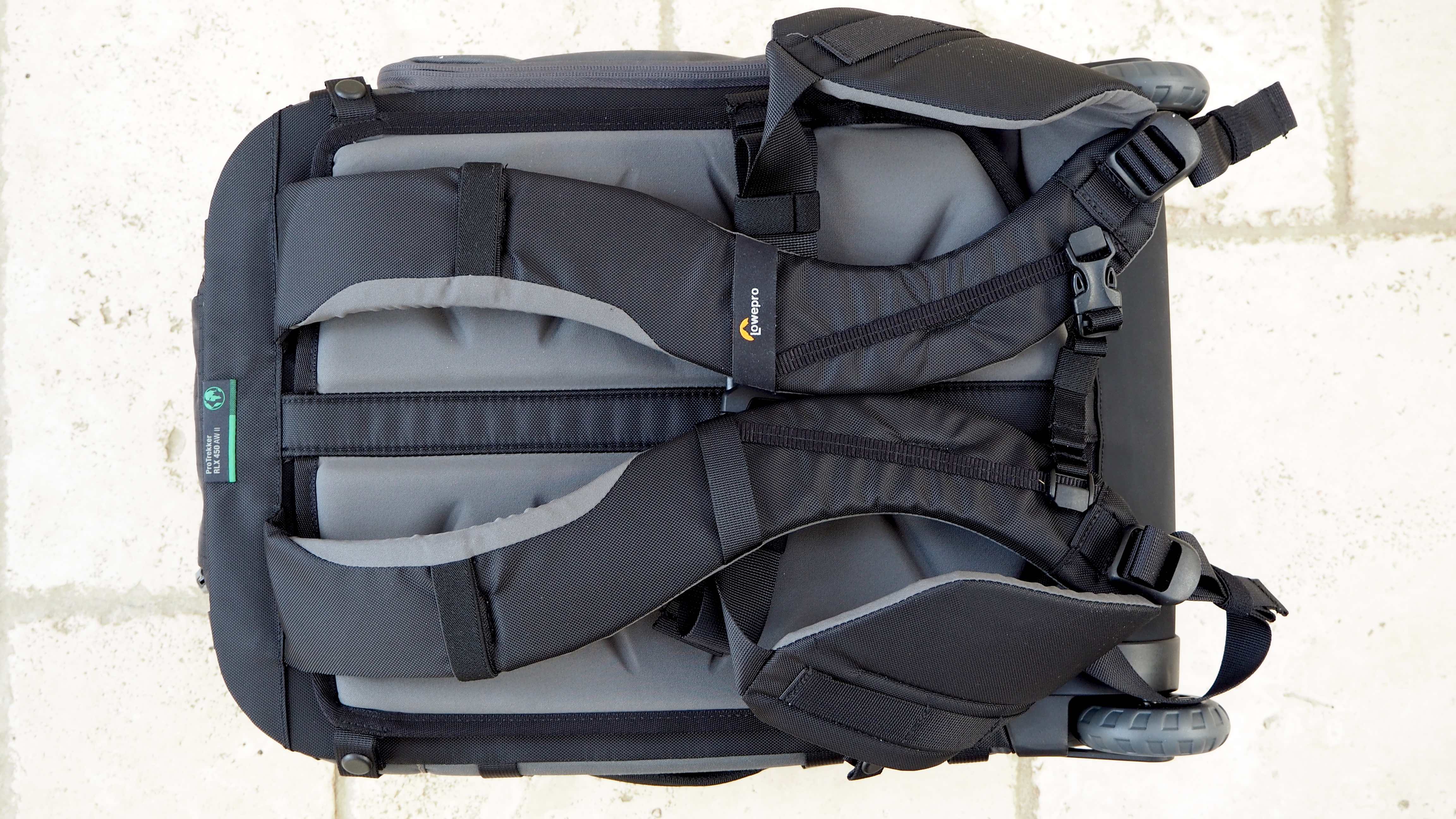
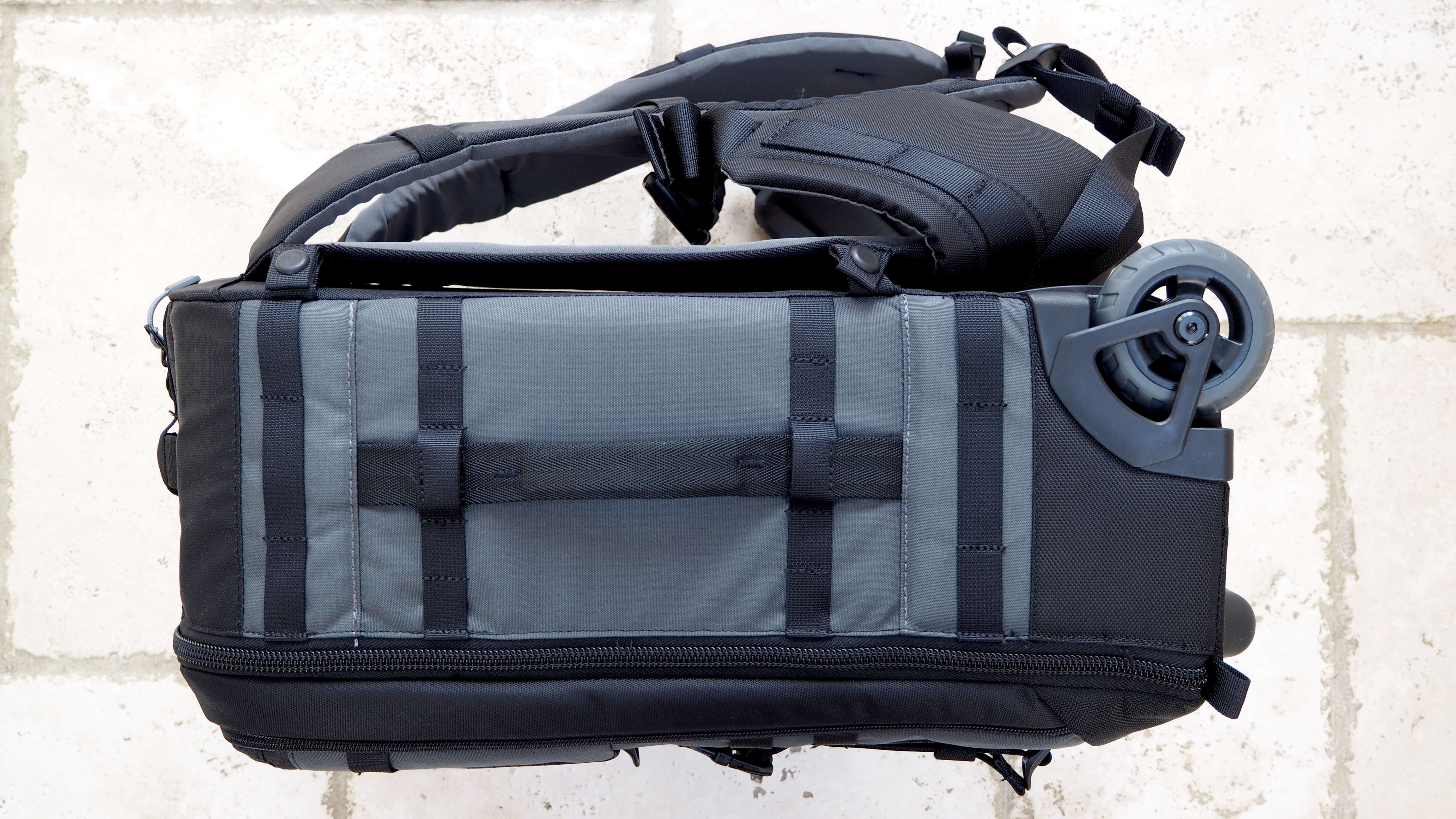
Lowepro Pro Trekker RLX 450 AW II: Performance
Does the Lowepro Pro Trekker RLX 450 AW II succumb to the cliché of being a jack of all trades, yet master of none?
Thankfully, no. In addition to back harness, trolley handle and wheels to aid transport, there are carry handles at the top, side and base for when we want to heft the bag into the boot of a taxi, or into an overhead cabin locker. With the ‘AW’ in the model name indicating an All Weather product, a tightly packed rain cover can be found secreted among the inner compartments.
One disappointment is that if you do want to quickly swap how the bag is being used, be aware the bottom of the backpack harness hangs level with the wheels at the back. The positioning means that, if slightly leaning the Lowepro Pro Trekker RLX 450 AW II to pull it along easier, the base of the harness will drag/scrape along the ground.
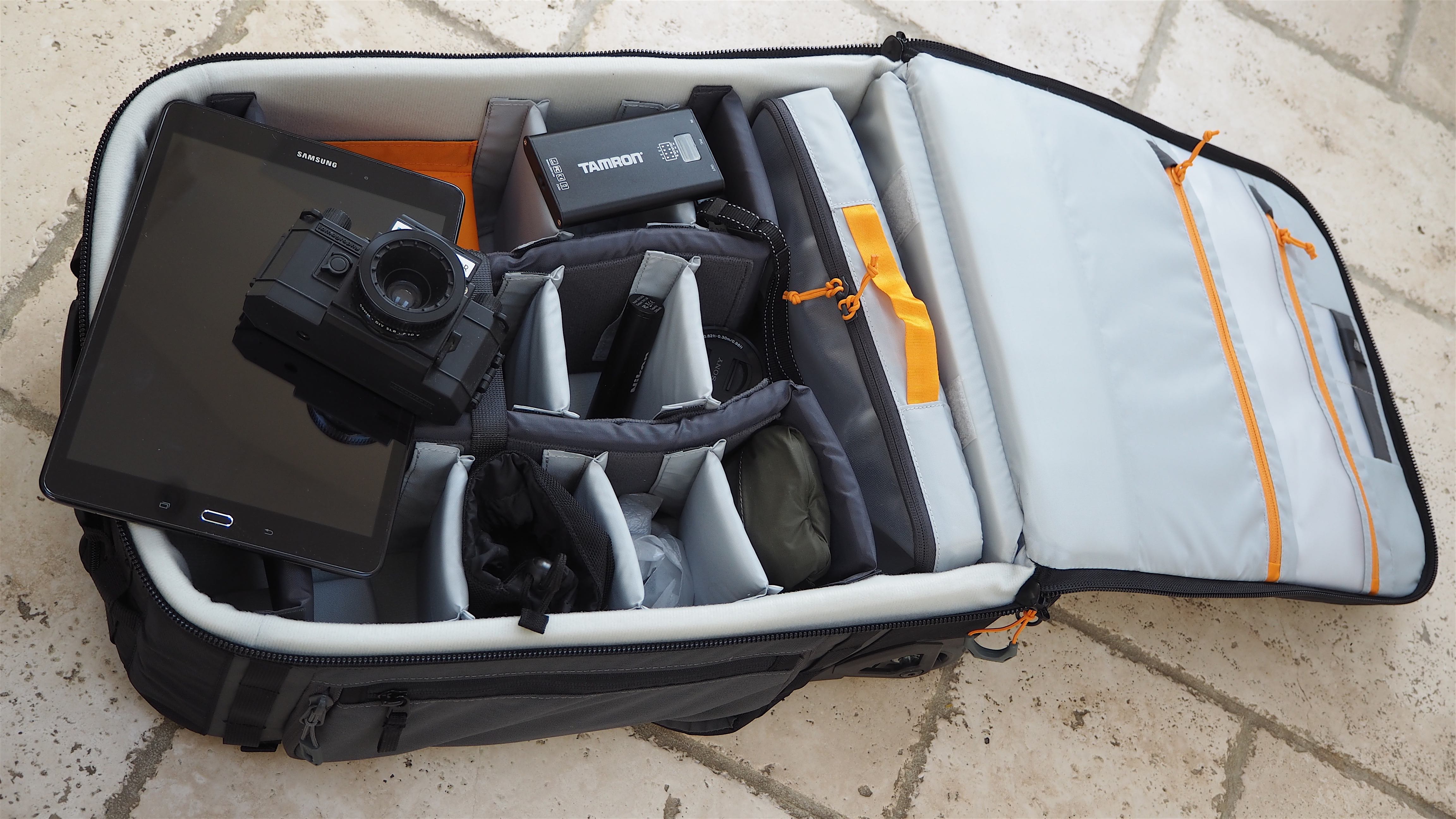
To avoid this if the user is in less of a rush, padded flaps at the back that aid comfort when worn can be popped open, wrapped around the straps, and pressed back into place to keep them off the floor and out of harm’s way. It all feels very practical and well considered, as I’d hoped at this high-ish asking price.
Round at the front of the bag we also find two slim, removable accessory straps. These, when combined with a provided tripod pouch, enable a regular sized tripod to be worn at the front, or to one side, if desired. Additionally at one side of the pack is a soft, flexible pocket for handily stowing a one litre water bottle, with plenty of other compartments for storing travel documents and the like.
As the Lowepro weighs over 4 kg when empty, when worn as a pack, even with a modest amount of photo gear and a small tablet inserted, it was already feeling heavy and rigid on my back. I could not imagine sightseeing all day with this one without taking regular breaks. That said, at least the straps are comfortably padded. Most importantly, my camera gear was held in place firmly enough that I felt reassured in the knowledge it would not be rattling around loose inside.
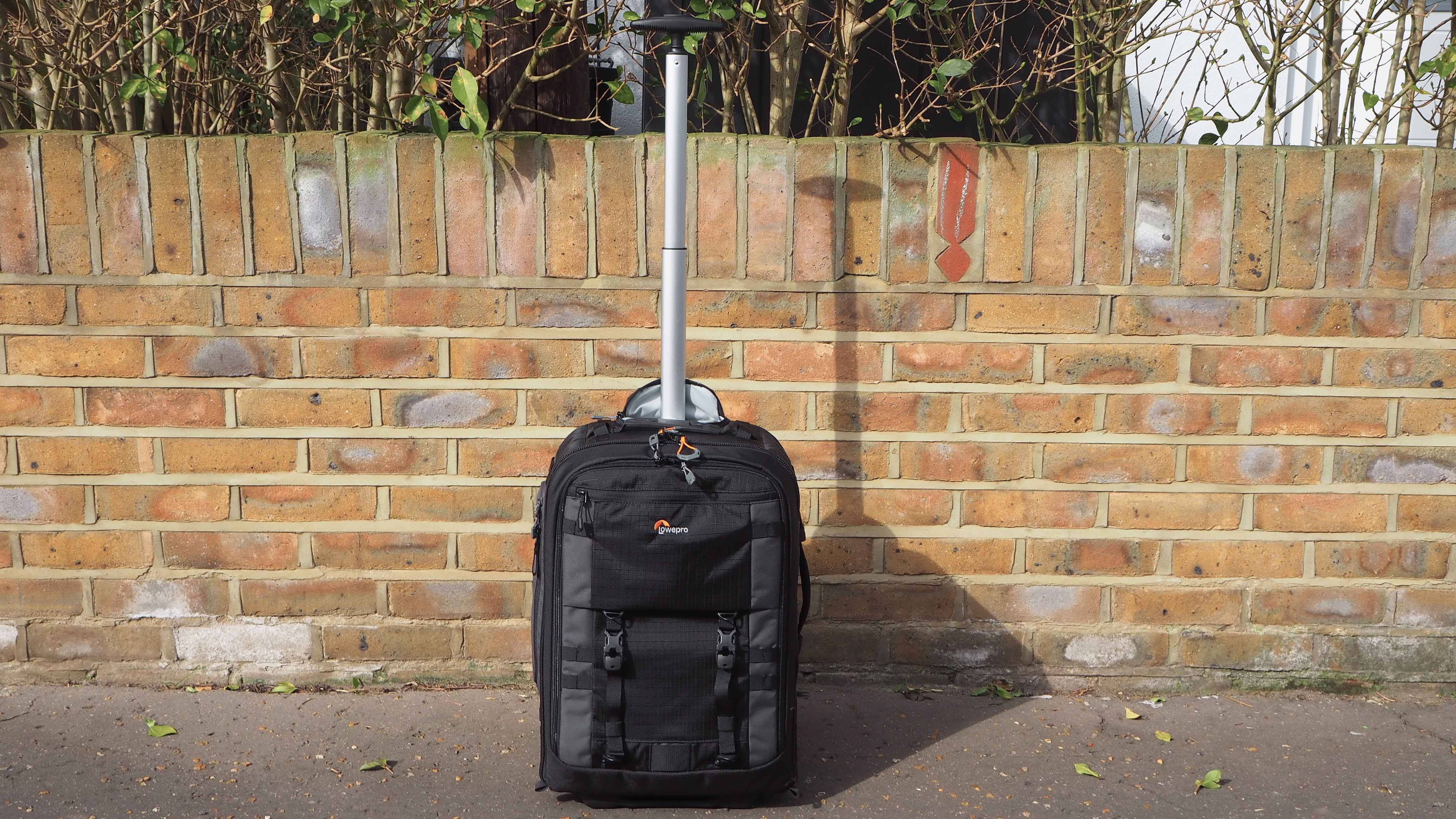
Lowepro Pro Trekker RLX 450 AW II: Verdict
If you’re a photographer / videographer who regularly travels a lot and wants one kit bag that offers a variety of different transportation options, when either your arm or back gets tired from wheeling it around or wearing it, the Lowepro Pro Trekker RLX 450 AW II will seem an attractive proposition.
Not everything is perfect – I’d have preferred rubber rather than plastic wheels for example – and the price is rather high at the time of writing, even if that’s partly justified because nearly everything about its build is premium quality. Sometimes flexibility is worth paying for if you’re a creative.
✅ Buy it if...
- If looking for a well-made and stylish airline compliant camera bag that has wheels and a trolley style handle for extra convenience, comfort and versatility.
❌ Don't buy it if...
- If you’re on a budget and want something a tad less bulky and more practically lightweight.
Alternatives
The closest rolling bag come backpack to this example that I’ve tested is the Vanguard VEO Select 55BT. At 3.9 kg, it’s of a similar weight, though feels more compact as the harness-like straps can be tucked away when you don’t want to wear it as a backpack. An alternative can be found in the Manfrotto Manhatan Runner 50, which while not outwardly resembling a backpack, does allow for the inner camera compartment with dividers to be removed from within the rolling case and that particular element to be worn as a pack, complete with padded shoulder straps.
A further flexible alternative is the Tenba Roadie Air Case Roller 21, though its rock-solid exterior padding does mean it weighs a hefty 4.7 kg before any camera gear has been loaded into it. As ever, increased layers of protection make for a heavier bag/case/pack.
For more options, including the extra degree of protection afforded by a hard plastic wheeling case, do visit our buyer’s guide to camera roller bags for photographers.







